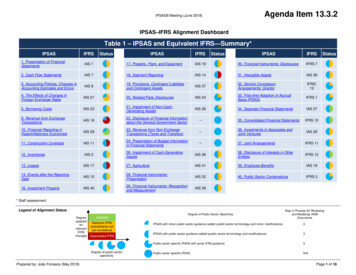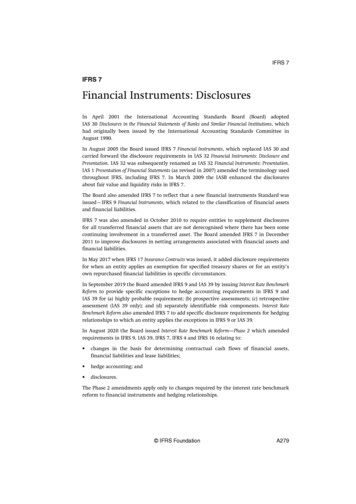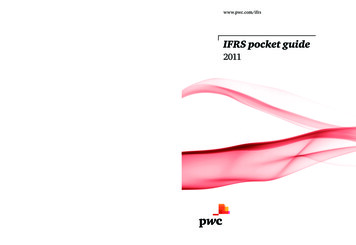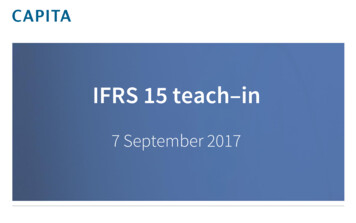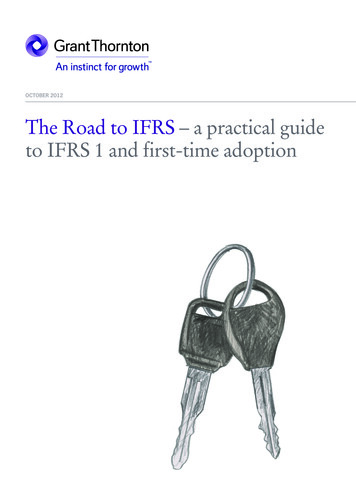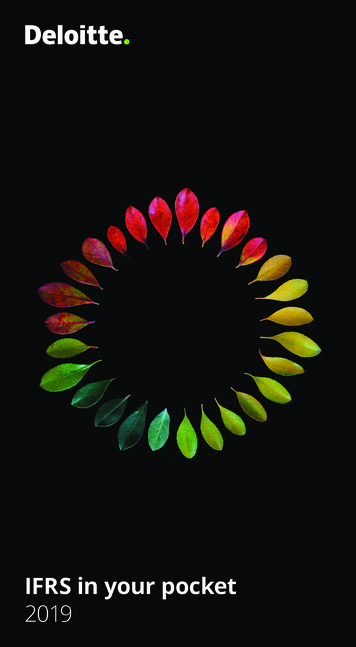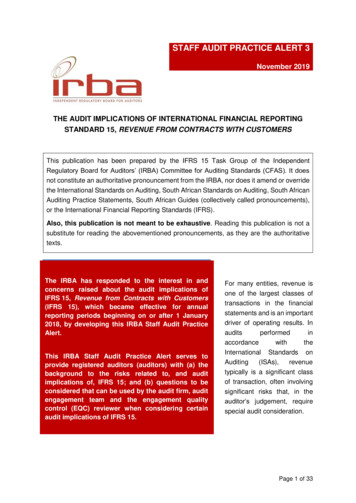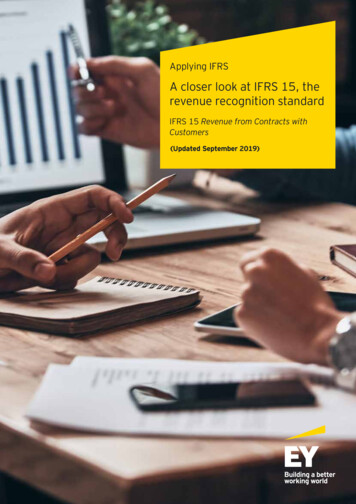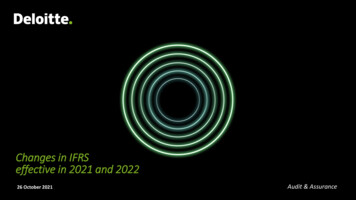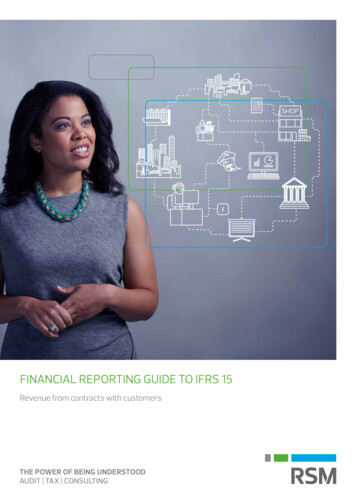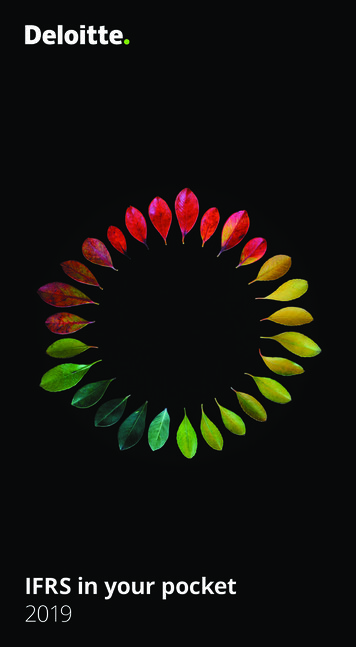
Transcription
IFRS in your pocket2019
ContentsAbbreviations1Foreword2Our IAS Plus website3IFRS Standards around the world5The IFRS Foundation and the IASB7Standards and Interpretations15Standards and Interpretations24Summaries of Standards and Interpretationsin effect at 1 January 2019Requirements that are not yet mandatory29100IASB projects104Deloitte IFRS resources111Contacts113
IFRS in your pocket 2019AbbreviationsARCAccounting Regulatory CommissionASAFAccounting Standards Advisory ForumDPDiscussion PaperECEuropean CommissionEDExposure DraftEFRAGEuropean Financial Reporting Advisory GroupGAAPGenerally Accepted Accounting PrinciplesIASInternational Accounting StandardIASBInternational Accounting Standards BoardIASC International Accounting Standards Committee(predecessor to the IASB)IFRIC Interpretation issued by the IFRS InterpretationsCommitteeIFRSInternational Financial Reporting StandardIFRS Standards All Standards and Interpretations issued by the IASB(i.e. the set comprising every IFRS, IAS, IFRIC and SIC)PIRPost-implementation ReviewSECUS Securities and Exchange CommissionSIC Interpretation issued by the Standing InterpretationsCommittee of the IASCSMEsSmall and Medium-sized EntitiesXBRLExtensible Business Reporting LanguageXMLExtensible Markup Language1
IFRS in your pocket 2019ForewordWelcome to the 2019 edition of IFRS in Your Pocket.It is a concise guide of the IASB’s standard-setting activities thathas made this publication an annual, and indispensable, worldwidefavourite.At its core is a comprehensive summary of the current Standardsand Interpretations along with details of the projects on the IASBwork plan. Backing this up is information about the IASB and ananalysis of the use of IFRS Standards around the world. It is theideal guide, update and refresher for everyone involved.This is another year of important changes in IFRS. IFRS 16 Leasesis mandatory for annual periods beginning on or after 1 January2019, along with a new Interpretation on uncertain tax positionsand seven amendments to Standards, of which four resulted fromthe IASB’s Annual Improvement process.Further along the horizon IFRS 17 Insurance Contracts is effectivefrom 1 January 2021, although that is likely to be deferred until1 January 2022.The IASB will also be seeking input on other projects. We expectto see continued activity on the projects under the umbrella ofBetter Communication in Financial Reporting and a broad range ofresearch projects, including wider corporate reporting.With so much going on, the best way you can keep up to datecontinuously with the latest developments in the arenas ofinternational and domestic financial reporting, is through ourwebsite www.iasplus.com. It is widely regarded as the mostcomprehensive source of news, and comment, about internationalfinancial reporting available today.Veronica PooleGlobal IFRS Leader2
IFRS in your pocket 2019Our IAS Plus websiteDeloitte’s IAS Plus (www.iasplus.com) is one of the most comprehensivesources of global financial reporting news on the Web. It is a centralrepository for information about International Financial ReportingStandards as well as the activities of the IASB. The site, which is alsoavailable in German, includes portals tailored to the United Kingdom,the United States, and Canada (in English and French) each with afocus on local GAAP and jurisdiction-specific corporate reportingrequirements.IAS Plus features: News about global financial reporting developments, presentedintuitively with related news, publications, events and more Pre-meeting summaries of the topics being discussed by the IASBand IFRS Interpretations Committee, and summaries of the meetingdiscussions and decisions reached Summaries of all Standards, Interpretations and projects, withcomplete histories of developments and standard-setter discussionstogether with related news and publications Rich jurisdiction-specific information, including background andfinancial reporting requirements, links to country-specific resources,related news and publications and a comprehensive history of theadoption of IFRS Standards around the world Detailed personalisation of the site, which is available by selectingparticular topics of interest and creating tailored views of the site3
IFRS in your pocket 2019 Dedicated resource pages for research and education, sustainabilityand integrated reporting, accounting developments in Europe, XBRLand Islamic accounting Important dates highlighted throughout the site for upcomingmeetings, deadlines and more A library of IFRS-related publications available for download andsubscription including our popular IFRS in Focus newsletter and otherpublications Model IFRS financial statements and checklists, with versionsavailable tailored to specific jurisdictions An extensive electronic library of both global and jurisdiction-specificIFRS resources Expert analysis and commentary from Deloitte subject matterexperts, including webcasts, podcasts and interviews E-learning modules for most of the IASB’s Standards Enhanced search functionality, allowing easy access to topics ofinterest by tags, categories or free text searches, with search resultsintuitively presented by category with further filtering options Deloitte comment letters to the IASB and numerous other bodies An interface that is smart-device friendly and updates through Twitterand RSS feeds4
IFRS in your pocket 2019IFRS Standards around theworldMost jurisdictions have reporting requirements for listed and othertypes of entities that include presenting financial statements that areprepared in accordance with a set of generally accepted accountingprinciples. IFRS Standards are increasingly that prescribed set ofprinciples and are used extensively around the world.We maintain an up-to-date summary of the adoption of IFRS Standardsaround the world on IAS Plus at: e-of-ifrsThe IFRS Foundation publishes individual jurisdictional profiles whichcan be found in: isdiction-profiles.aspxEurope43 jurisdictions in Europe require IFRS Standards to be applied by allor most of their domestic publicly accountable entities. Switzerlandpermits the use of IFRS Standards.Europe has a strong endorsement process that requires eachnew Standard or Interpretation, or amendment to a Standard orInterpretation, be endorsed for use in Europe. That process involves: translating the Standards into all European languages; the private-sector EFRAG giving its endorsement advice to the EC; the EC’s ARC making an endorsement recommendation; and the EC submitting the endorsement proposal to the EuropeanParliament and to the Council of the EU.Both must not oppose (or in certain circumstances must approve)endorsement within three months, otherwise the proposal is sentback to the EC for further consideration. Further information onendorsement is available from Deloitte: rope. The most recent status on EUendorsement of IFRS Standards can be found at: http://www.efrag.org/Endorsement. The UK is considering how the adoption of new IFRSrequirements will be undertaken after the UK leaves the EU.The Americas27 jurisdictions in the Americas require IFRS Standards to be appliedby all or most of their domestic publicly accountable entities. A further8 jurisdictions permit or require IFRS Standards for at least somedomestic publicly accountable entities.5
IFRS in your pocket 2019In the United States, foreign private issuers are permitted to submitfinancial statements prepared using IFRS Standards as issued by theIASB without having to include a reconciliation of the IFRS figures toUS GAAP. The SEC does not permit its domestic issuers to use IFRSStandards in preparing their financial statements; rather, they arerequired to use US GAAP.Asia-Oceania25 jurisdictions in Asia-Oceania require IFRS Standards to be appliedby all or most of their domestic publicly accountable entities. A further3 jurisdictions permit or require IFRS Standards for at least somedomestic publicly accountable entities.Africa36 jurisdictions in Africa require IFRS Standards to be applied by all ormost of their domestic publicly accountable entities and one permits orrequires IFRS Standards for at least some domestic publicly accountableentities.Middle East13 jurisdictions in the Middle East require IFRS Standards to be appliedby all or most of their domestic publicly accountable entities.Filing requirementsThe IASB is also gathering information about the filing requirements forfinancial statements prepared in accordance with IFRS Standards. Thisincludes an assessment of requirements to file electronic versions ofthe financial statements, and the form of those filings.There is an increasing use of structured data filings using theXML-based language called XBRL. The SEC requires that foreign filerssubmit financial data in XBRL for annual periods ending on or after15 December 2017. Electronic filing requirements using XBRL and theIFRS Taxonomy are scheduled to take effect in Europe in 2020.The SEC and European electronic filings must use the IFRS Taxonomymaintained by the IASB. More information is available at /6
IFRS in your pocket 2019The IFRS Foundation and theIASBIFRS FoundationThe IFRS Foundation is the organisation that develops IFRS Standardsfor the public interest. It has a staff of around 150 people and has itsmain office in London and a smaller Asia-Oceania office in Tokyo.Within the Foundation is the IASB, an independent body of accountingprofessionals that is responsible for the technical content of IFRSStandards. The staff of the Foundation support the work of theIASB. It has technical staff who analyse issues and help the IASB(and its interpretations body the IFRS Interpretations Committee)make technical decisions. Other staff provide support to adoptingjurisdictions, publications, education, communications (including thewebsite), investor relations, fundraising and administration.International Accounting Standards BoardThe IASB is a technical standard-setting bodyMembershipThe IASB has up to 14 members. Most are fulltime, so that they commit all of their time to paidemployment as an IASB member. Up to three canbe part-time, but they are expected to spend mostof their time on IASB activities.All members of the IASB are required to committhemselves formally to acting in the public interestin all matters.Global balanceFour members are appointed from each ofAsia-Oceania, Europe and the Americas and onemember from Africa.One additional member can be appointed from anyarea, subject to maintaining overall geographicalbalance.Qualificationsof IASBmembersMembers are selected to ensure that at all timesthe IASB has the best available combination oftechnical expertise and diversity of internationalbusiness and market experience to develop highquality, global financial reporting standards.Members include people who have experience asauditors, preparers, users, academics and marketand/or financial regulators.7
IFRS in your pocket 2019TermThe maximum term is 10 years – an initial term offive years and a second term of three years, or upto five years for the Chair and Vice-Chair.MeetingsThe IASB meets in public to discuss technicalmatters, usually each month except August.The current members of the IASB are profiled at g-standards-board/#membersIFRS Interpretations CommitteeThe IFRS Interpretations Committee is responsible fordeveloping Interpretations of IFRS StandardsMembershipThe Committee has 14 members, appointedbecause of their experience with IFRS Standards.They are not paid, but the IFRS Foundationreimburses members for out-of-pocket costs.MeetingsThe Committee meets in public to considerrequests to interpret IFRS Standards. It meets everytwo months.InterpretationsIf the Committee decides that an IFRS Standardis not clear and that it should provide aninterpretation of the requirements it eitherdevelops an Interpretation or, in consultation withthe IASB, develops a narrow-scope amendment tothe IFRS Standard.Deciding to develop an Interpretation, oramendment, means that the Committee has takenthe matter onto its agenda. The developmentof an Interpretation follows a similar processto the development of an IFRS Standard. Theyare developed in public meetings and the DraftInterpretation is exposed for public comment.Once the Interpretation has been completed itmust be ratified by the IASB before it can be issued.Interpretations become part of IFRS Standards, sohave the same weight as any Standard.Agendadecisions8If the Committee decides that it need not, or cannot,develop an Interpretation it publishes a tentativeAgenda Decision, explaining why it does not intendto develop an Interpretation. Once the Committeehas considered feedback on the tentative decisionit can decide to finalise that decision, or it could addthe matter to its agenda. The final agenda decisionssometimes contain an analysis of the relevantStandard that is helpful to preparers.
IFRS in your pocket 2019Due processThe IASB and its Interpretations Committee follow a comprehensive andopen due process built on the principles of transparency, full and fairconsultation and accountability. The IFRS Foundation Trustees, throughits Due Process Oversight Committee, is responsible for overseeingall aspects of the due process procedures of the IASB and the IFRSInterpretations Committee, and for ensuring that those proceduresreflect best practice.TransparencyAll technical discussions are held in public (andusually via webcast) and the staff-prepared IASBpapers are publicly available. The purpose ofthe staff papers is to ensure that the IASB andIFRS Interpretations Committee have sufficientinformation to be able to make decisions basedon the staff recommendations. A final Standard orInterpretation must be approved by at least 9 of the14 members of the IASB.Full and fairconsultationThe IASB must: Hold a public consultation on its technical workprogramme every five years Evaluate all requests received for possibleinterpretation or amendment of a Standard Debate all potential standard-setting proposalsin public meetings Expose for public comment any proposednew Standard, amendment to a Standard orInterpretation Explain its rationale for proposals in a basis forconclusions, and individual IASB members whodisagree publish their alternative views Consider all comment letters received on theproposals, which are placed on the public record,in a timely manner Consider whether the proposals should beexposed again Consult the Advisory Council on the technicalprogramme, major projects, project proposalsand work priorities Ratify any Interpretations developed by the IFRSInterpretations Committee9
IFRS in your pocket 2019Additionally, the IASB must undertake the followingsteps, or explain why they do not consider them tobe necessary for a specific project: Publish a discussion document (for example, aDP) before specific proposals are developed Establish a consultative group or other types ofspecialist advisory group Hold public hearings Undertake fieldworkAccountabilityAn effects analysis and basis for conclusions (anddissenting views) are published with each newStandard.The IASB is committed to conducting postimplementation reviews of each new Standard ormajor amendment of an existing Standard.Further information on the IASB due process can be found s/Consultative bodiesAdvisorygroupsThe IFRS Advisory Council meets twice a year.Its members give advice to the IASB on its workprogramme, inform the IASB of their views onmajor standard-setting projects and give otheradvice to the IASB or the Trustees. The AdvisoryCouncil has at least 30 members (and currentlyhas about 45), including a member from Deloitte.Members are appointed by the Trustees and areorganisations and individuals with an interest ininternational financial reporting from a broad rangeof geographical and functional backgrounds.The Accounting Standards Advisory Forum (ASAF)meets with the IASB four times a year, in a publicmeeting, to discuss technical topics. It comprisesa standard-setter from Africa, three from eachof the Americas, Asia-Oceania and Europe andtwo from any area of the world at large, subject tomaintaining an overall geographical balance.Standingconsultativegroups10Capital Markets Advisory Committee (users), GlobalPreparers Forum (preparers), Emerging EconomiesGroup, Islamic Finance Consultative Group, IFRSTaxonomy Consultative Group, SME ImplementationGroup, World Standard-setters Conference.
IFRS in your pocket 2019TransitionResourceGroupsCreated for specific new Standards (Impairmentof Financial Instruments, Insurance Contracts andRevenue Recognition).ProjectconsultativegroupsRate Regulation, Management CommentaryIFRS Foundation (and IASB)7 Westferry Circus, Canary Wharf, London E14 4HD, UKTelephone: 44 (0) 20 7246 6410General e-mail: info@ifrs.orgWebsite: www.ifrs.orgAsia-Oceania officeOtemachi Financial City - South Tower, 5F, 1-9-7, Otemachi,Chiyoda-ku, Tokyo 100-0004, JapanTelephone: 81 (0) 3 5205 7281Fax: 81 (0) 3 5205 7287General e-mail: AsiaOceania@ifrs.org11
IFRS in your pocket 2019GovernanceMonitoring BoardOversees thetrustees and providesa formal link betweenthe Trustees andpublic authoritiesTrustees of the IFRSFoundationResponsible for thegovernance andoversight of the IASBIFRSAdvisorycouncilA soundingboard forthe IASBand theTrusteesIASBResponsible fordeveloping andapproving all Standardsand InterpretationsAdvisesReports toIFRS InterpretationsCommitteeConsider requests tointerpret how IFRSStandards should beapplied – can developInterpretations orminor amendmentsfor the IASBASAFProvide technicalsupport and advice tothe IASBProject ConsulativeGroupsProvide advice on majorprojects to develop anew StandardStanding ConsultativeGroupsProvide advice from aparticuar sector or on aspecial topicTransition ResourcegroupsProvide transitionsupport for major newStandardsMonitoring BoardThe Monitoring Board provides formal interaction between capitalmarkets authorities and the IFRS Foundation. It provides publicaccountability of the IFRS Foundation through a formal reporting linefrom the Trustees of the Foundation to the Monitoring Board.12
IFRS in your pocket 2019Responsibilities Approves the appointment of the Trustees Reviews the adequacy and appropriateness ofTrustee arrangements for financing the IASB Reviews the Trustees’ oversight of the IASB’sstandard-setting process, particularly withrespect to its due process arrangements Confers with the Trustees regarding theresponsibilities pertinent to the IFRSFoundation’s oversight to the IASB, particularlyin relation to the regulatory, legal and policydevelopments Can refer matters of broad public interest relatedto financial reporting to the IASB through theIFRS FoundationMembershipThe Monitoring Board currently comprisesrepresentatives of the International Organizationof Securities Commissions (IOSCO), the IOSCOGrowth and Emerging Markets Committee, theEuropean Commission (EC), Financial ServicesAgency of Japan (JFSA), US Securities and ExchangeCommission (SEC), Brazilian Securities Commission(CVM), Financial Services Commission of Korea(FSC) and the Ministry of Finance of the People’sRepublic of China. The Basel Committee on BankingSupervision is a non-voting observer.13
IFRS in your pocket 2019Trustees of the IFRS FoundationThe Foundation’s governing body is the Trustees of the IFRS Foundation.Responsibilities Appoint members of the IASB, the IFRSInterpretations Committee and the IFRS AdvisoryCouncil Establishing and amend the operatingprocedures, consultative arrangements anddue process for the IASB, the InterpretationsCommittee and the Advisory Council Review annually the strategy of the IASB andassess its effectiveness Ensure the financing of the IFRS Foundation andapprove its budget annuallyThe Trustees ensure that the IASB develops IFRSStandards in accordance with its due processrequirements, through the Trustee Due ProcessOversight Committee.MembershipThere are 22 Trustees, each being appointed for athree-year term, renewable once. The exception isthat a trustee can be appointed to serve as Chairor Vice-Chair for a term of three years, renewableonce, provided that the total period of service doesnot exceed nine years.Trustees are selected to provide a balance ofpeople from senior professional backgrounds whohave an interest in promoting and maintainingtransparency in corporate reporting globally. Tomaintain a geographical balance, six trustees areappointed from each of Asia-Oceania, Europe andthe Americas, one Trustee is appointed from Africaand three Trustees are appointed from any area,subject to maintaining the overall geographicalbalance.14
IFRS in your pocket 2019Standards and InterpretationsThe IASB was established in 2001, replacing the International AccountingStandards Committee (IASC). The IASC, which was established in 1973,was a consensus body and its purpose was to harmonise financialreporting standards. It produced Standards called InternationalAccounting Standards (IAS Standards) and its Interpretations werecalled SIC Interpretations. One of the first actions of the IASB was toadopt all of the IASC’s IAS Standards and SIC Interpretations as itsown. The IASB undertook a major project to improve 13 of these IASStandards, finalising and issuing the revised IAS Standards in 2004.At the same time, the IASB started to develop new Standards andInterpretations, calling each new Standard an IFRS Standard and eachInterpretation an IFRIC Interpretation.IFRS 1 First-time Adoption of International Financial ReportingStandards defines the IASB’s full set of requirements asIFRS Standards.IFRS Standards comprise the IAS Standards, SICInterpretations, IFRS Standards and IFRIC Interpretationsadopted or issued by the IASB. All of these individualrequirements have equal authority.Transition overlapWhen the IASB amends or issues new Standards it provides a period oftransition before the new requirements are mandatory, but generallyallows entities to apply the new requirements before the mandatorydate. The effect is that there is sometimes a choice of requirementsavailable to entities. For example, an entity could continue to applyIFRS 4 Insurance Contracts in periods beginning 1 January 2019 or it couldelect to apply IFRS 17 Insurance Contracts.The IASB produces two volumes of Standards and Interpretations –the Blue and Red Books.Blue BookThe Standards and Interpretations that an entitywould apply if it elected not to apply any newrequirements before the mandatory date. Thisvolume does not include the versions of Standardsor Interpretations that have an effective dateafter 1 January of that year. For example, the 2019volume includes IFRS 4 Insurance Contracts, but notIFRS 17 Insurance Contracts.15
IFRS in your pocket 2019Red BookThe Standards and Interpretations that anentity would apply if they applied all of the newrequirements earlier than required. This volumedoes not include the versions of Standards orInterpretations that those new requirements arereplacing. For example, the 2019 volume includesIFRS 17 Insurance Contracts, but not IFRS 4 InsuranceContracts.The IASB also produces annotated versions of these volumes thatreproduce the agenda decisions issued by the IFRS InterpretationsCommittee and cross-references to the basis for conclusions andrelated Standards or Interpretations.Unaccompanied Standards and Interpretations are availableon the IFRS Foundation website: rds/. The versions are a mixture ofextracts from the RED and BLUE Books and are updated at thebeginning of each calendar year.The non-mandatory implementation and illustrative guidanceand bases for conclusions that accompany the Standards andInterpretations are not freely available. IASB pronouncementsand publications can be purchased in printed and electronicformats from the IFRS Foundation.IFRS Foundation Publications department orders and enquiries:Telephone: 44 (0) 20 7332 2730 Fax: 44 (0) 20 7332 2749Website: http://shop.ifrs.org e-mail: publications@ifrs.orgIn the sections that follow, we have summarised the requirements ofthe Standards and Interpretations on issue at 1 January 2019. Thesesummaries are intended as general information and are not a substitutefor reading the entire Standard or Interpretation.Preface to International Financial Reporting StandardsCovers, among other things, the objectives of the IASB, the scopeof IFRS Standards, due process for developing Standards andInterpretations, equal status of ‘bold type’ and ‘plain type’ paragraphs,policy on effective dates and use of English as the official language.Adopted by the IASB in May 2002, amended in 2007, 2008 and 2010.16
IFRS in your pocket 2019Conceptual Framework for Financial ReportingOverviewDescribes the objective of, and the concepts for,general purpose financial reporting.Purpose andstatusAssists the IASB to develop Standards that arebased on consistent concepts; preparers todevelop consistent accounting policies when noStandard applies to a particular transaction orother event, or when a Standard allows a choiceof accounting policy; and all parties to understandand interpret the Standards.It is not a Standard and sits outside of IFRSStandards. Nothing in the Framework overrides anyStandard or any requirement in a Standard.The Objectiveof GeneralPurposeFinancialReportingThe objective of general purpose financialreporting is to provide financial information aboutthe reporting entity that is useful to existing andpotential investors, lenders and other creditors inmaking decisions relating to providing resources tothe entity.Those decisions include buying, selling or holdingequity and debt instruments, providing or settlingloans and other forms of credit, exercising rights tovote on, or otherwise influence, management.General purpose financial reports provideinformation about the resources of, and claimsagainst, an entity and the effects of transactionsand other events on those resources and claims.QualitativeCharacteristicsof UsefulFinancialInformationFor financial information to be useful, it needsto meet the qualitative characteristics set outin the Framework. The fundamental qualitativecharacteristics are relevance and faithfulrepresentation.Financial reports represent economic phenomenain words and numbers. To be useful, financialinformation must not only represent relevantphenomena, but it must also faithfully representthe substance of the phenomena that it purportsto represent.17
IFRS in your pocket 2019Faithful representation means the informationmust be complete, neutral and free from error.Neutrality is supported by exercising cautionwhen making judgements under conditions ofuncertainty, which is referred to in the Frameworkas prudence. Such prudence does not imply aneed for asymmetry, for example, a systematicneed for more persuasive evidence to supportthe recognition of assets or income than therecognition of liabilities or expenses. Suchasymmetry is not a qualitative characteristic ofuseful financial information.Financial information is also more useful if it iscomparable, verifiable, timely and understandable.FinancialStatementsand theReportingEntityFinancial statements are prepared from theperspective of an entity as a whole, rather thanfrom the perspective of any particular group ofinvestors, lenders or other creditors (the entityperspective).Financial statements are prepared on theassumption that the reporting entity is a goingconcern and will continue in operation for theforeseeable future.A reporting entity is an entity that chooses, or isrequired, to prepare financial statements. Obviousexamples include a single legal structure, such asan incorporated company, and a group comprisinga parent and its subsidiaries.A reporting entity need not be a legal entity,although this makes it more difficult to establishclear boundaries when it is not a legal entity, or aparent-subsidiary group. When a reporting entityis not a legal entity, the boundary should be set byfocusing on the information needs of the primaryusers. A reporting entity could also be a portionof a legal entity, such as a branch or the activitieswithin a defined region.The Framework acknowledges combined financialstatements. These are financial statementsprepared by a reporting entity comprising twoor more entities that are not linked by a parentsubsidiary relationship. However, the Frameworkdoes not discuss when or how to prepare them.18
IFRS in your pocket 2019The Elementsof FinancialStatementsAn asset is a present economic resource controlledby the entity as a result of past events.An economic resource is a set of rights – the rightto use, sell, or pledge the object, as well as otherundefined rights. In principle, each right could bea separate asset. However, related rights will mostcommonly be viewed collectively as a single assetthat forms a single unit of account.Control links a right to an entity and is the presentability to direct how a resource is used so as toobtain the economic benefits from that resource(power and benefits). An economic resource can becontrolled by only one party at any point in time.A liability is a present obligation of the entity totransfer an economic resource as a result of pastevents. An obligation is a duty or responsibility thatan entity has no practical ability to avoid.An entity may have no practical ability to avoid atransfer if any action that it could take to avoidthe transfer would have economic consequencessignificantly more adverse tha
3 jurisdictions permit or require IFRS Standards for at least some domestic publicly accountable entities. Africa 36 jurisdictions in Africa require IFRS Standards to be applied by all or most of their domestic publicly accountable entities and one permits or requires IFRS Standards for at least some domestic publicly accountable entities.

